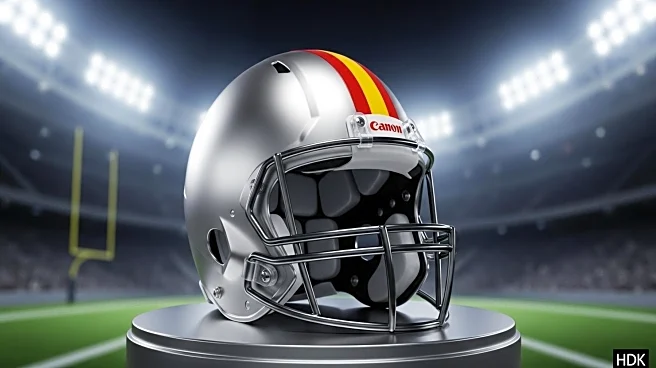What's Happening?
Detroit Lions safety Brian Branch has been suspended for one game without pay by the NFL for unsportsmanlike conduct. The suspension follows an incident where Branch punched Kansas City Chiefs receiver JuJu Smith-Schuster after the Lions' loss to the Chiefs. NFL Vice President of Football Operations Jon Runyan condemned Branch's actions as unwarranted and a violation of sportsmanship standards. Branch will miss the Lions' next game against the Tampa Bay Buccaneers, further challenging the team's already strained secondary. Branch's suspension comes after he was fined for previous unsportsmanlike conduct penalties, highlighting ongoing issues with player behavior.
Why It's Important?
Branch's suspension is a significant setback for the Detroit Lions, who are dealing with injuries in their secondary. The incident underscores the importance of maintaining sportsmanship in the NFL and may influence future league policies on player conduct. The Lions, currently with a 4-2 record, face a tough matchup against the Buccaneers without Branch, which could impact their performance and standings. The situation also highlights the role of coaching in managing player behavior, as Lions Coach Dan Campbell publicly condemned Branch's actions, emphasizing the team's commitment to sportsmanship.
What's Next?
Branch's suspension will be reviewed through an appeal process, which could affect the duration of his absence from the team. The Lions will need to adjust their defensive strategy to compensate for Branch's absence in their upcoming game against the Buccaneers. The appeal outcome may set a precedent for handling similar cases in the future, influencing league policies and disciplinary measures. The Lions' response to the incident, including Coach Campbell's statements, may impact team dynamics and public perception, potentially affecting the team's approach to player conduct and discipline.
Beyond the Headlines
The incident raises broader questions about aggression and retaliation in professional sports, particularly in high-pressure environments like the NFL. It highlights the need for effective disciplinary measures and the role of coaching in fostering a respectful and competitive atmosphere. The league's handling of the situation may prompt discussions on the effectiveness of current policies and the need for more comprehensive approaches to player conduct. The implications could include shifts in how teams manage player behavior and the importance of maintaining sportsmanship in professional sports.











